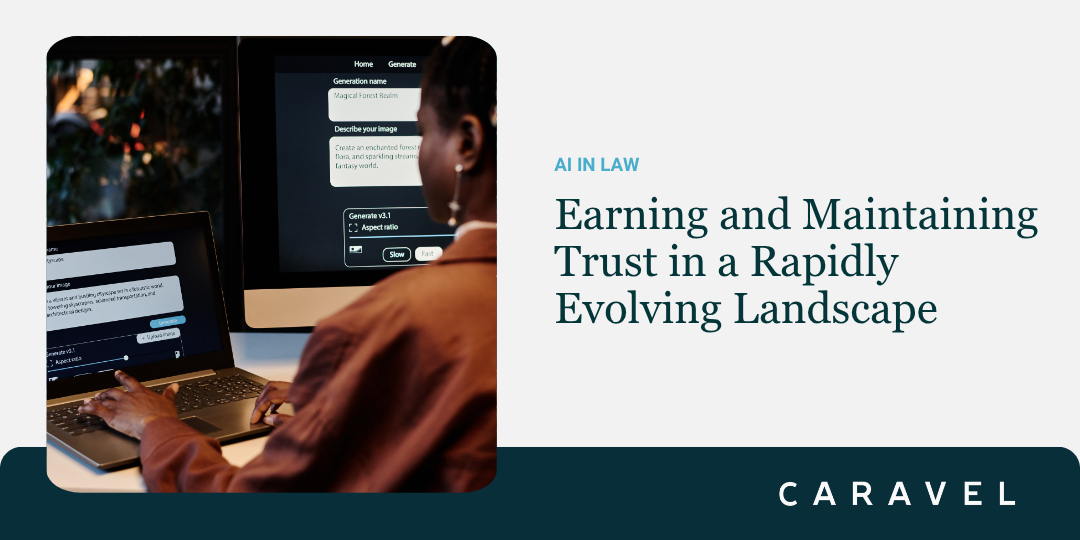
Artificial intelligence is no longer a futuristic concept—it’s here, reshaping how legal departments and law firms operate. From automating document review to streamlining legal research, AI tools offer general counsels a compelling opportunity to reduce overhead, enhance accuracy, and improve responsiveness.
But as with any transformative technology, adoption isn’t just about efficiency. It’s about trust.
Trust in the data. Trust in the tools. Trust that the technology is being used ethically—and that those using it understand its limitations. For general counsels tasked with overseeing risk, compliance, and legal integrity, this trust must be earned and continuously maintained.
At Caravel Law, we’ve been early adopters of legal technology, leveraging cutting edge tools to reinvent the legal space since our inception in 2005. We understand that trust must extend not just to the tools themselves, but to the people using them. For general counsels overseeing risk and governance across an organization, that trust is paramount—and it must be earned, safeguarded, and continually reinforced.
Let’s explore how legal teams, like yours, can do just that, with a focus on three critical pillars of ethical AI adoption: training, accuracy, and privacy.
Training: Responsible Use Starts With the User
AI’s value in legal work is only realized when the user knows how—and when—to use it. While these tools can enhance productivity, they are not substitutes for legal reasoning or professional judgment.
That’s why appropriate training must be the first step. Legal departments need to equip their teams with more than just access—they need to provide the context, caution, and competence to use AI effectively. This includes understanding:
- When AI is appropriate (e.g., summarizing long documents) and when it’s not (e.g., drafting final contracts or giving legal advice)
- How to critically assess AI-generated outputs
- What ethical responsibilities apply when integrating AI into workflows
| Tip for GCs: Consider developing internal guidelines or certification programs for AI usage within your legal team. This helps foster a culture of responsible adoption and minimizes risk from misuse or overreliance.
Accuracy: Trust, But Always Verify
Perhaps the most discussed risk of AI tools in legal settings is accuracy—and for good reason. AI-generated content can contain factual errors, cite non-existent cases, or omit key nuances. In legal work, these kinds of mistakes aren’t minor—they’re potentially consequential.
A 2022 ABA Legal Technology Survey Report found that concerns around accuracy remain the top barrier preventing many legal professionals from adopting AI. The issue isn’t just whether AI gets it mostly right—it’s whether you can verify how and why it arrived at its conclusion. Legal professionals must apply a human layer of verification to every AI-assisted task.
| Practical move: Build review protocols into your team’s workflow for any output generated with AI—just as you would with junior team members’ drafts. A second set of eyes should never be optional.
Privacy: Protecting What Matters Most
Legal departments handle some of the most sensitive data in any organization—from employment matters to confidential transactions to privileged communications. Introducing AI into this environment raises critical questions about how that data is handled, stored, and shared.
Many popular generative AI tools store or learn from user inputs. Unless you’re using an enterprise-secure environment with clear boundaries around data retention and use, you may be putting sensitive information at risk.
It’s not enough to rely on tool providers to protect data—general counsels must take the lead in ensuring that privacy standards are being upheld internally and externally.
Key questions to ask:
- Does the tool store prompts or responses?
- Is client or company data ever used to train models?
- Are our use cases aligned with confidentiality obligations?
| Reminder: Even anonymized or partial client information can be problematic if it ends up in an uncontrolled environment. Err on the side of caution—and transparency.
Final Thoughts: A Culture of Trust, Not Just Tools of Convenience
AI holds tremendous potential to improve how legal teams work. But its value will always be measured against one core standard: can we trust it?
At Caravel, we believe that trust is built through training, verified through diligence, and protected by design. By investing in ethical, transparent, and secure AI practices, GCs can lead their organizations forward—embracing innovation without compromising their professional responsibility.
The technology will continue to evolve. So must our approach to using it—ethically, intelligently, and always with purpose.
To learn more about how Caravel remains on the cutting edge of legal tech, connect with us today.